In April 2022, Caiden Wilson, then 15, was loading balls into the pitching machine for his teammates to practice batting. Someone took a swing at a ball before Caiden had a chance to dive behind the L-screen and protect himself. The ball slammed into his right temple. Caiden fell onto his face, unconscious. He awoke, dazed.
“He was very confused and kept asking what happened. He was just saying he felt like he was going to die and that everything hurts. He must have told me 50 times he was going to die,” Mom Becca Wilson tells TODAY.com. “When I saw him immediately, I just knew something was not right.”
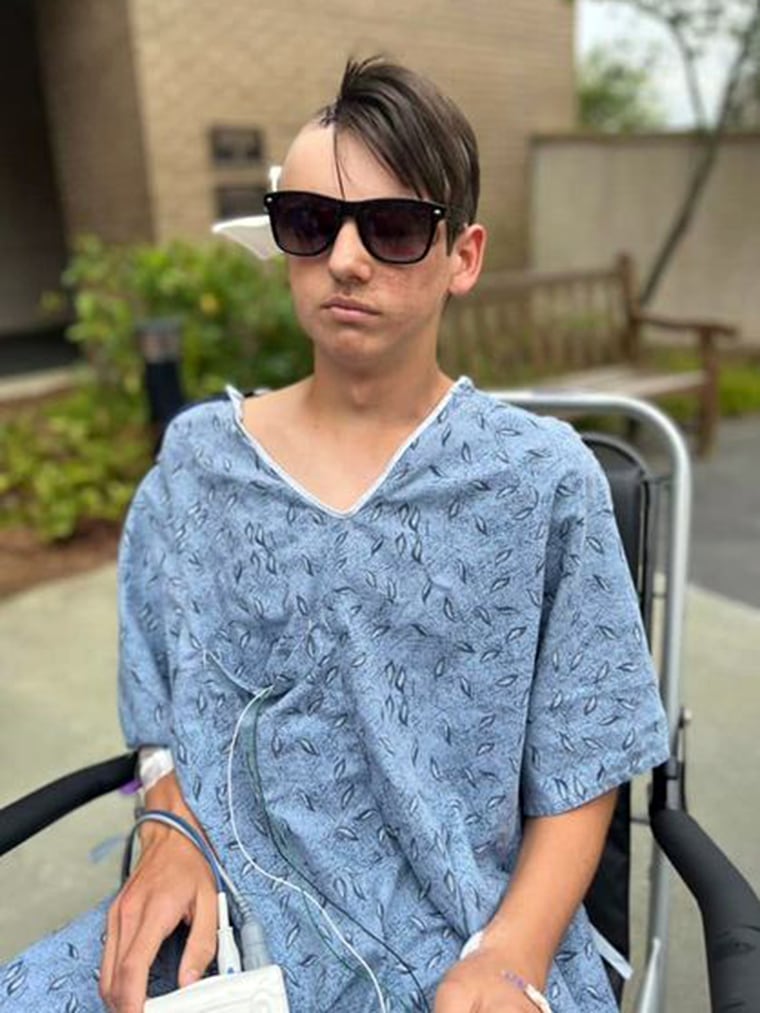
An ambulance rushed Caiden to Children’s Healthcare of Atlanta’s Scottish Rite campus, where his family learned the extent of his injuries. Caiden had a concussion, fractures to his skull and nasal bones, and bleeding between the brain and the surrounding membrane — as well as an uncal herniation, when pressure inside the cranium causes parts of the brain to shift, and an epidural hematoma, when blood accumulates between the brain and skull.
“A CT confirmed the brain bleed, and they asked us to actually step out of the trauma room,” Becca Wilson says. “At that point, he aspirated, and they had to intubate him, and I really felt like it was a blessing that we had stepped out of the room and didn’t have to witness that part of it.”
Warm-up for a game ends with an accident
On April 13, 2022, Caiden’s ninth grade undefeated baseball team was warming up to take on a rival team. Becca Wilson was setting up the concession stand when she noticed a player running out of the batting cages to get the coach.
“Another player had run up to let me know that Caiden had been hit,” she recalls. “I ran down to the cages, and he had regained consciousness.”
His nose was “busted,” and he was bleeding, Becca Wilson says. She was worried by how confused her son was acting and called 911. The paramedics said she could drive Caiden to the hospital if she wanted.
“I was like, ‘I’m absolutely not putting him in my car. He’s going by ambulance, and I’m going to go with you guys,’” Becca Wilson says. “He was alert and in and out of consciousness in the ambulance on the way there.”
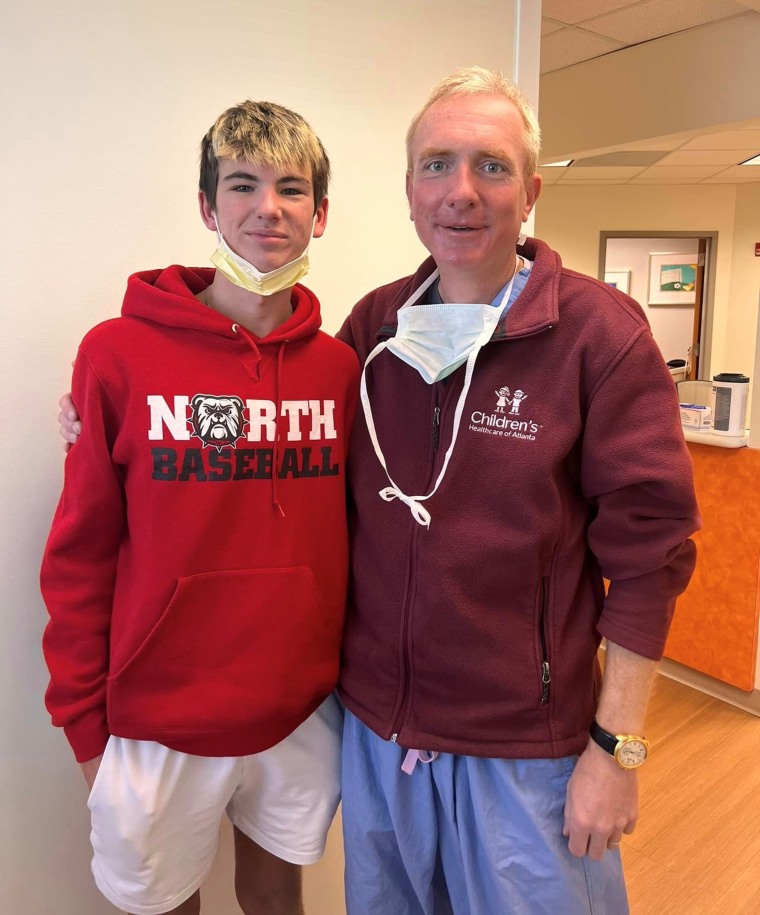
As soon as he arrived at the hospital, he underwent a CT scan to identify a brain bleed, and doctors wanted to do an X-ray of his neck. But then he started choking and was rushed to surgery to “save him," his mom says.
“It was terrifying,” she adds. “When I look back on it, I don’t really know how or why I was that calm.”
As Becca Wilson and husband Tim waited during the surgery, they didn’t know what to expect when Caiden came out.
“We didn’t know how severe the brain bleed was. It all happened really, really fast,” Becca Wilson says. “When we got into his room after surgery, it was breathtaking.”
About 80 staples ran along the middle of his head, from the top of his forehead to the back of his skull, keeping the skin closed after the surgery. The bleed was so big that it surprised the doctor.
“They don’t typically see them that large, and if they are that large, then the recovery is usually difficult,” Becca Wilson says. “It could take months, it could take years to recover, so we just didn’t know what to expect.”
Epidural hematoma and head injuries
When the baseball hit Caiden in the head, it fractured his skull.
“As far as skull fractures go, (it) wasn’t too bad," but the fracture "was located directly over an artery that supplies the covering of the brain," which caused it to bleed, Dr. David Wrubel, a pediatric neurosurgeon at Children’s Healthcare of Atlanta, who treated Caiden, tells TODAY.com. “That artery, when it’s injured like that, blood collects outside the brain but inside the skull, and when that happens ... it also adds significant pressure on the brain.”
That pressure prevents oxygen from getting into the brain, which can lead to stroke or death, he says. After Caiden arrived, the pressure in his brain had reached such a point that he had “declined neurologically," Wrubel recalls.
“The brain tolerates some amount of pressure, but then once it gets to the tipping point, things usually progress very rapidly,” Wrubel says. “The longer there’s that pressure, the worse the outcome can be.”
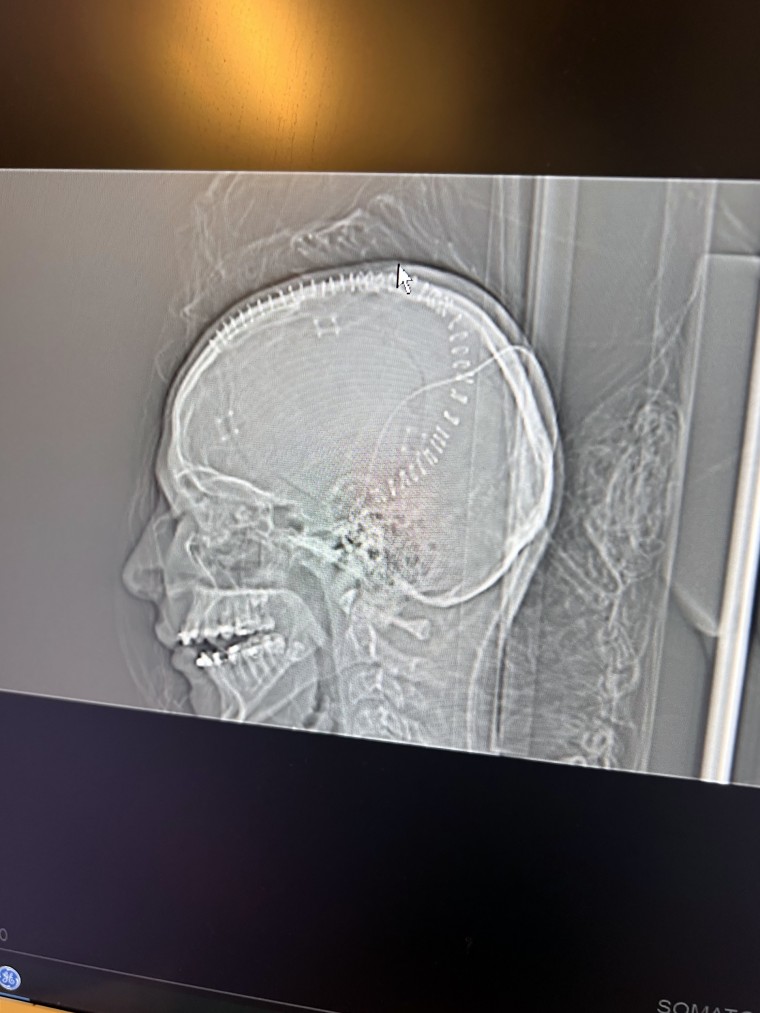
Wrubel and his team needed to remove part of Caiden’s skull to remove the blood clot and stop the bleeding.
“The surgery did what he needed,” Wrubel says. “Because there was that significant pressure on the brain, it does take a bit of time to recover from that.”
That means patients in Caiden's situation often need to undergo speech, occupational and physical therapy to regain strength and in some cases relearn skills.
“I tell the families with these things that my job is easy because I go in there remove the blood clot and fix the problem,” Wrubel says. “They have the harder part of the job because it takes days and weeks and — not in Caiden’s case — but sometimes even months of therapy and work in order to recover.”
While an epidural hematoma is serious, they are rare, especially in sports. But other head injuries aren’t, and Wrubel urges people to closely watch children and teens, if they experience head injuries.
Parents should seek medical help if they notice their child:
- Complaining of severe headaches
- Vomiting
- Problems staying awake
- Seizures
- Starts acting differently than normal
“Those are all things that are fairly big red flags that you want to get checked out in the emergency department,” he says. “If somebody takes a blow to the head and goes right back to themselves and (is) not having any problems, that in all likelihood is going to be fine. But anybody who’s having persistent problems, any neurological deficits, all those things do need to be checked out.”
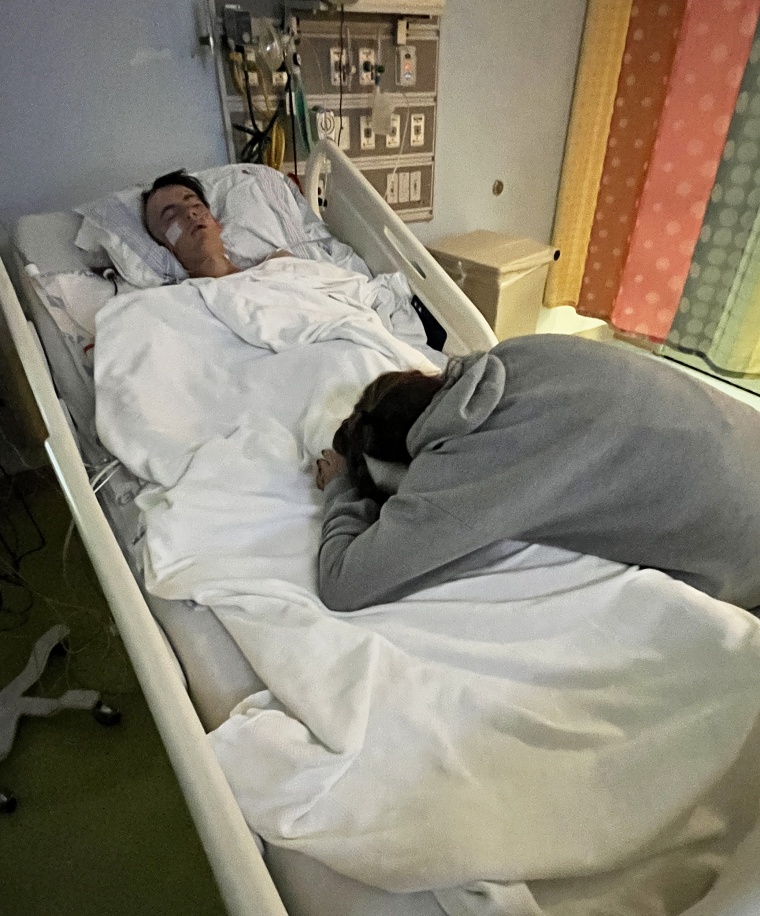
Recovery
When Caiden woke up, he felt unsure what had happened.
“He’s like, ‘Hey, am I playing this weekend?’ And we had to explain to him what had happened,” Tim Wilson tells TODAY.com. “Seeing him recognize the seriousness of the injury, that was difficult because ... he just loves to play sports and specifically baseball. So then it started another whole series of questions like, ‘Will I ever be able to play baseball again?’”
His doctors and parents couldn’t answer that question. Even when he started rehabilitation, no one knew how long recovery would take.
“They put a balance beam at Children’s, and he went to take his first couple steps, and he couldn’t even step onto the balance beam,” Tim Wilson says. “It kind of hits you like, ‘OK, is he ever going to be able to … have a normal life?’”
Nine days after he got to the hospital, Caiden went to in-patient rehabilitation. He felt worried about what recovery might be like.
“The first couple days, I was really struggling with things that I could have done with my eyes closed, backwards, upside down my whole life and just not being able to do them,” the now 16-year-old tells TODAY.com. “It wasn’t even physically challenging, like tiring. It was really mentally challenging.”
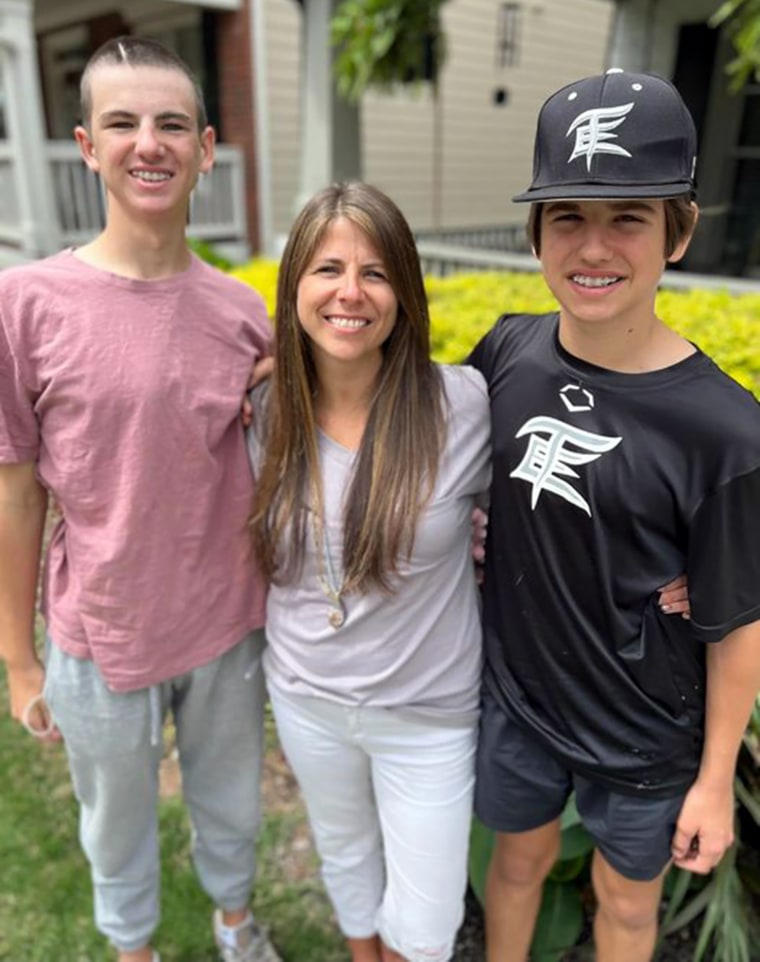
He kept working with his therapists and enjoyed visiting the Zone, a recreation room of sorts at the hospital that allowed Caiden and other patients to play sports, video games or ping pong. By April 27, Caiden was able to go home. He did have to take the rest of the baseball season off, and his summer was pretty tame compared to his friends'.
“Every time he goes somewhere, we’re like, ‘Remember you have a second lease on life, and you don’t have the same luxury (as) somebody that hasn’t had this type of injury,’” Tim Wilson says. “There’s just rules, new, different rules we have now.”
The third-base player has returned to the field after slowly starting training with his dad and working with the infield trainer.
“I stepped back on the field in the fall, and the first game, the nerves were running really high,” Caiden says. “After I got that one under my belt, it was just right back to what I’ve been doing my whole life.”
The Wilson family hopes that people learn how important it is to seek help after a head injury.
“If they lose consciousness, err on the side of caution and take them to the emergency room quickly,” Tim Wilson says. “I want Caiden to be an inspirational example for people to don’t give up.”